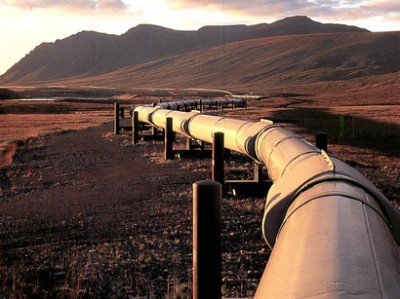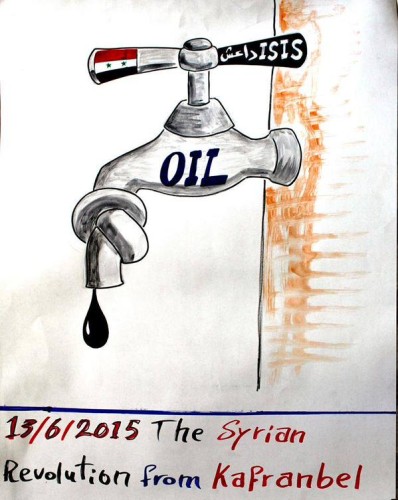Published in partnership with The Conversation:
Syria’s opposition and rebels have taken a string of cities and towns from the Syrian military since the start of 2015, but thanks to pressure from the Islamic State (IS) and the Assad regime, they are facing devastating shortages of fuel.
Syria has been beset by a general crisis over oil and gas supplies amid the escalation of the four-year conflict, with the Assad regime losing almost all of its oil fields and about half of its gas fields to the Islamic State. Damascus has been forced to cut subsidies, further raising prices for businesses and residents — but the shortages on the government side have been mitigated by IS’s regular sales of fuel to the regime.
In contrast, IS has imposed a cut-off on the rebels, whom it has been battling since January 2014. In northern Syria, IS has not only refused to sell the rebels oil and gas, but has blocked long-time smugglers from doing so.
As the opposition has consolidated control of newly-captured areas — notably in Idlib Province, but also in other territory extending into central Syria — the lack of fuel is affecting agriculture, factories, businesses, aid deliveries, bakeries, water supply, and infrastructure such as hospitals. The price of bread has doubled and even tripled in only a few weeks. Petrol prices have also tripled.
Hospitals and bakeries are closing as #ISIS continue to block fuel to north #Syria.
— Abdurahman Lam'e (@abdlame) June 18, 2015
#ISIS has cut off all kind of fuel on northern #Syria 1 litre of diesel z (1.5 $) f u could find any! No generators=no electricity= no water
— Zaina Erhaim (@ZainaErhaim) June 16, 2015
On June 16, Syrian civil defense teams issued a call for help from humanitarian organizations, as well as a token appeal to “all those responsible for the fuel crisis” to ease the restrictions. The head of civil defense, Raed a-Salih, confirmed that the crisis had “all but paralyzed” rescue work.
In northern Hama Province, the rebel-affiliated Health Administration declared the suspension of all hospital and clinic work from Monday because of the diesel crisis.
A Syrian Civil Defence worker said 14 newborn children had died at a hospital in Maarat al-Numan because there was no fuel for incubators:
We’ve stopped everything other than ambulance work. We can’t use our machines to get people out of the rubble after bombings anymore – there’s no fuel for it. So we’ve gone back to digging them out by hand.
“Diesel has been cut off for two weeks because the Islamic State is not allowing convoys to pass from the eastern regions,” media activist Hukm Abu Riyan confirmed. “They’re cutting off the heads of fuel truck drivers heading to the area.”
#Syria: important hospital in #Hama province may be forced to close due to a diesel shortage https://t.co/humyk2dTQc pic.twitter.com/L6vpe7dCBo
— Thomas van Linge (@arabthomness) June 17, 2015
An activist said the price of diesel was now 550 Syrian Pounds (about $1.80) per litre, in an area of northern Syria where the average monthly salary is 15,000 SYP (about $50). He concluded, “They [the Islamic State] put their hands on all the country’s resources while the people go hungry.”
The Idlib News Network confirmed the account, putting the price of diesel at 600 SYP (about $2.00) per litre, in a “call of distress”. It said the situation had been worsened by continued regime bombing and shelling, retaliating for losses on the ground and hoping to break infrastructure: “We do not see bread as usual and hospitals are no longer working.” Shaam News Network added that the Syrian military is blocking trucks with fuel from entering rebel-held territory.
A Bleak Future
The pain is unlikely to ease any time soon. While the Assad regime and the the Islamic State are not working together, each sees the rebels as the main threat. Faced with rapid rebel advances in both the northwest and south of Syria — including the capture of a provincial capital, other cities, and large military bases — Damascus will maintain its blockade.
Meanwhile, the Islamic State has launched an offensive in northern Aleppo Province and is protecting its control of resources. So it is unlikely to treat the opposition with the business-like approach in which “supplies to regime areas seem to remain unchecked“.
A local source, reinforcing the claims that the Islamic State has been enforcing the cut-off by beheading smugglers, summarizes:
This part of a plan to starve off the north after [the rebel coalition] Jaish al-Fateh made all its advances and the battles in Aleppo began against both ISIS and the regime.
I don’t see a solution besides taking the war to the oilfields, whether they are controlled by the Islamic State or Damascus.
True disaster situation closing in on Aleppo now. Humanitarian situation is worse than it has ever been since start of the revolution.
— The Revolting Syrian (@YallaIr7al) June 16, 2015
Meanwhile, the hopes for relief from outside the country are also slim. NGOs have just started to ask local representatives for plans. The agencies in Turkey have no fuel tankers, and insufficient access to barrels to bring in supplies with cargo trucks — only the Turkish military has the equipment in place to draft and execute short-term relief, but it is bound by legal constraints. Any deliveries also face the regime’s threat from the skies: convoys of fuel tankers are extremely vulnerable to air attacks, and at the moment there is no one willing to provide air cover for shipments.
“I suspect we can survive for two more weeks,” Idlib-based activist Tareq Abdelhaq says. “Some traders have stocks stored . . . so do the rebels, and I suspect they’ll start giving some to bakeries and hospitals.”
A rebel in northern Syria confirms that they have enough tankers and barrels for some operations, drawing on fuel tanks from captured regime bases, and that deliveries have beung. However, “these supplies aren’t infinite”, he notes drily.
The rebel faction Ahrar al-Sham arranging fuel deliveries:
Is there any consolation? A local activist offers this: “The situation in the north is still way better than in besieged areas like East Ghouta and Western Ghouta [near Damascus], districts in south Damascus, or al-Waer in Homs — where people literally die like flies from starvation, lack of medicine, or heat during the winters since the sieges began in 2012.”
However, another local source is anticipating that the crisis may match the desperation in the south:
Without instant help from NGOs and the UN, the situation in the north will soon escalate.
It is not only those who are internally displaced that suffer the most that will move to Turkey — there will also be hungry locals from Hama, Idlib, Latakia, and Aleppo Provinces.
Asked if she was projecting hundreds of thousands to add to the almost 2 million Syrian refugees in Turkey, she replied: “More.


